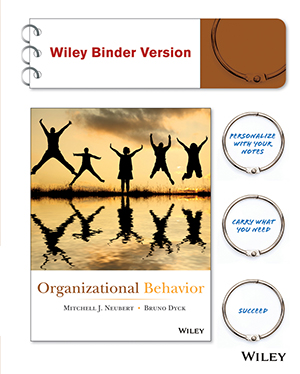
Organizational Behavior
By Mitchell J. Neubert, Bruno Dyck
Unlike any other OB textbook in the market, Organizational Behavior by Neubert/Dyck empowers students to look at OB through two “lenses”: the traditional, core concepts that focus on how to make a company profitable, as well as the collaboration, creativity, and ethical decision-making that lead to developing sustainable businesses.
By inviting students to compare and contrast short-term profitability and long-term sustainability, Neubert/Dyck’s Organizational Behavior helps students build the critical thinking skills they need to positively affect organizations, people, and communities.
Accompanying Neubert/Dyck’s Organizational Behavior is WileyPLUS, a research-based, online environment for effective teaching and learning. WileyPLUS now offers ORION, an adaptive learning experience that guides students as they build their proficiency on topics. Based on cognitive science, WileyPLUS with ORION helps students learn by learning about them. For instructors, WileyPLUS offers automatically graded assignments or tests and a gradebook for monitoring student progress. Available in or outside of the Blackboard Learn™ environment, WileyPLUSreaches all types of learners and gives instructors the tools they need to enhance course material.
Schedule a Demo Request Instructor AccountWant to learn more about WileyPLUS? Click Here
Dual Approach
Helps instructors draw attention to the distinct contribution OB can make toward providing a more holistic understanding of organizations and their place in the world, today and in the future.
Opportunity for Critical Thinking
Offering two approaches fosters students’ critical thinking as they compare and contrast approaches and realize how organizational behavior is improved when integrating complementary views.
Inspiring Practitioner Examples
One of the distinguishing features of this book is that it highlights managers who can inspire students to make a difference in the world.
Focus on Ethics & Sustainability
By exploring the reasoning for sustainable OB practices, students become more sensitive to how values and ethics influence decisions about OB practices.
Chapter Navigators
The authors start each chapter with a visual outline of how students will progress through the chapter content. Chapter Navigators are featured throughout each chapter—under each major heading—to let students know where they are in the chapter, to identify the concepts they’ve covered, and see what material is ahead.
Timely
The text reflects current trends in popular media and scholarly literature, especially the movement of people seeking greater meaning in their work and organizations becoming more attentive to long-term societal well-being.

DR. MITCHELL J. NEUBERT
Dr. Mitchell J. Neubert is an Associate Professor of Management and Entrepreneurship at Baylor University. He currently serves in the Chavanne Chair of Christian Ethics in Business. In his role as the Chavanne Chair, Neubert provides leadership to programs and initiatives that promote his conviction that businesses can do well by doing good. He also held the H.R. Gibson Professorship in Management Development at Baylor University for seven years. Prior to arriving at Baylor, he served as the Director for Masters Programs in Organization Development at Bowling Green State University. He earned his PhD in OB/HR from the University of Iowa.
Neubert’s teaching and research focus on equipping leaders to lead individuals, teams, and organizations in a virtuous manner that results in positive change. He has been published in several academic journals, including Leadership Quarterly, Personnel Psychology, Journal of Applied Psychology, Human Relations, Journal of Business and Psychology, Human Performance, Business Horizons, Journal of Business Venturing, and Journal of Applied Behavioral Science.

DR. BRUNO DYCK
Dr. Bruno Dyck is a Professor of Organization Theory in the I.H. Asper School of Business at the University of Manitoba, where he has won research and teaching awards. His research interests include: developing management theory and practice that is not primarily based on materialism and individualism; studying organizational change and learning; understanding the role of values in management theory and practice.
Dyck’s work has been published in leading scholarly journals, such as Administrative Science Quarterly, Academy of Management Review, Business Ethics Quarterly, Case Research Journal, Journal of Applied Behavioral Science, Journal of Business Venturing, Journal of Developmental Entrepreneurship, Nonprofit and Voluntary Sector Quarterly, and Journal of Management Studies.
Chapter 1: Putting People First
Chapter 2: Exploring The Landscape Of OB
Chapter 3: Understanding Individual Attributes
Chapter 4: Considering Individual States
Chapter 5: Motivating Individuals
Chapter 6: Making Decisions
Chapter 7: Leading Self
Chapter 8: Understanding Relationships
Chapter 9: Leading Others
Chapter 10: Groups And Teams
Chapter 11: Communicating With Purpose
Chapter 12: Understanding Organizational Culture And Structure
Chapter 13: Developing Organizational Culture And Structures
Chapter 14: Motivating With Systems
Chapter 15: Leading Organizational Change
Chapter 16: Creating Organizations

